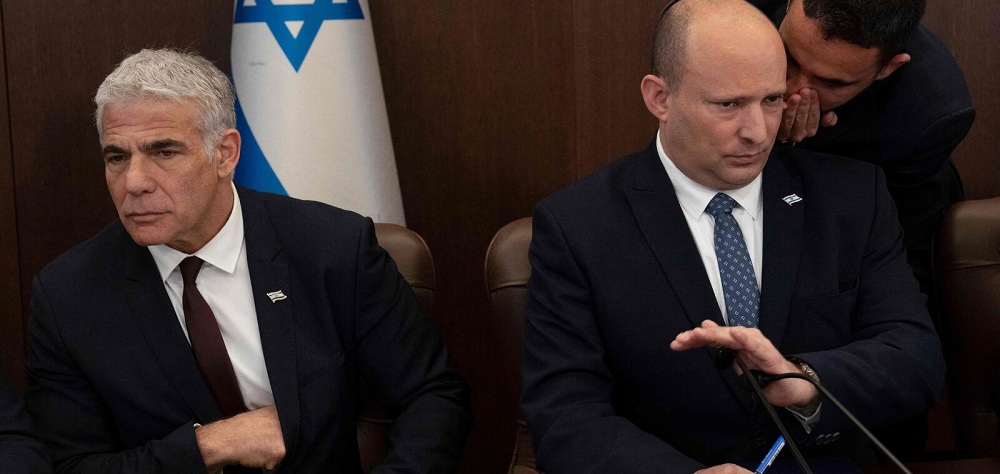Alwaght- Recent years' experiences of the Israelis in government formation are all failure stories. While the Israeli leaders strive for a cabinet that can serve four years and hold regular elections, Tel Aviv experiences in recent decades suggest that such a system is unsuccessful and the parties cannot form a stable government. Like its precedents, the government of Prime Minister Neftali Bennett collapsed, on its first anniversary, and snap elections are set to be held in three months— the fifth in four years. In normal conditions, one election in four years is sufficient.
Political stability is considered one of the main factors of survival and collapse in all countries, and the more stability there is, the longer durability and continued life of the governments. Otherwise, the governments collapse before their legal term ends. Today, Israel is suffering from lack of a stable cabinet and hence grappling with a serious political crisis in its 74th year of foundation on the occupied Palestinian soil.
Although the leaders of the Israeli opposition parties always welcome the holding of early elections to test their chances for victory, in the past two decades no party has been able to win an election with an overwhelming majority and the leading parties have had to form a coalition with other parties to form a cabinet. The conflict of interests among the leaders of the parties has always shortened the life of the cabinets, causing early elections and political stalemates.
A majority of the Israeli society and political observers argue that this time either the elections cannot put an end to the political impasse and the new chapter of crises will continue in the occupied territories. This was also admitted by President Issac Herzog who said that early Knesset elections would not serve Israel and are even detrimental to it. Such a view from Israel's senior officials shows that political crises can no longer be resolved. Israeli media polls indicate that the upcoming elections will suffer the same fate as the previous ones, and if a cabinet is formed, its life will be short. Therefore, the expectation for fundamental changes in the results of the upcoming elections is like seeking water from a mirage and according to Israeli experts, this issue will gradually lead this regime to abyss and destruction.
According to the Israelis, the early elections are self-immolation for the parties, and besides bringing no clear horizon for the political limbo and can even bear security consequences. On the other hand, the holding of repeated elections imposes a lot of costs on the citizens, and in the future can foment internal protests that have been unfolding nonstop in recent years.
Cabinet crisis mirroring internal turmoil
The repeated collapse of the governments is driven by inter-party disputes. One of the reasons that shortens the life of the cabinets in Tel Aviv is that none of the right, left and moderate parties can win the majority in the elections. Although the far-rights have had more power than the moderates in the last two decades and the prime ministers were elected from these parties, they also had to form alliances with other political factions. Differences have always overshadowed the cabinet stability and the result is always parliament dissolution. The only solution to overcome the political crisis is for each of these parties to win the majority, and this is not possible due to the multitude of the parties.
The Israeli political system, which allows even the small parties to enter the parliament with securing 3.5 percent of the threshold, has a hand in this instability. Therefore, party multitude is the root of the political crisis and large number of parties in the cabinet motivates them to seek ransom. Given the fact that the coalitions stand on a shaky foundation, even withdrawal of a trivial party, or even a member of that party, brings them to collapse.
With the makeup of the cabinets largely heterogeneous and many parties, even Arab ones, are present in them, the political process is tough and differences overshadow the decisions on important issues. Israeli citizens now ask for amendments to election laws as they argue that the current path not only yield no political salvation but also push to the brink.
Strongly criticizing Tel Aviv's policies, Israeli analysts believe that the conflicts between the parties in the cabinet and parliament have increased in an unprecedented way, and all the parties are fighting each other and do not have a consensus on any of the debated issues.
The political gaps are now so deep that the Israelis believe that their enemy is not Iran, Hezbollah, or Hamas but it is themselves that are accelerating movement to destruction. Thus, it can be suggested that the current political gaps are a prelude to future social chasms and this is a cause to new crises. The developments of the past year showed that the change in political parties and the coming and going of leaders not only does not help resolve the differences of the parties but also makes the situation even labyrinthine.
From another perspective, one of the reasons behind the Israeli political chaos is failure to realize its global ideals. Initially, the Zionist founding fathers envisioned the foundation of Jewish nation-state and encouraged Jews from around the world to migrate to the "promised land." This agenda was stabilizing in the early decades of foundation of Israel. But this uniting factor vanished after seven decades and the Israeli society is now a non-matching puzzle of communities with no interest in failed dreams and ideals. Tens of thousands of Jews frustrated with nation-state making process returned to their original countries in reverse migration waves. Creation of a united identity has always been an obsession of the Tel Aviv leaders. They have been unsuccessful to realize this dream despite their media propaganda.
Racial discrimination and division between Israeli leaders and citizens are rising as a chronic disease that shatters the Israeli existence into pieces. With its society largely polarized, Israel can collapse from within anytime.



























